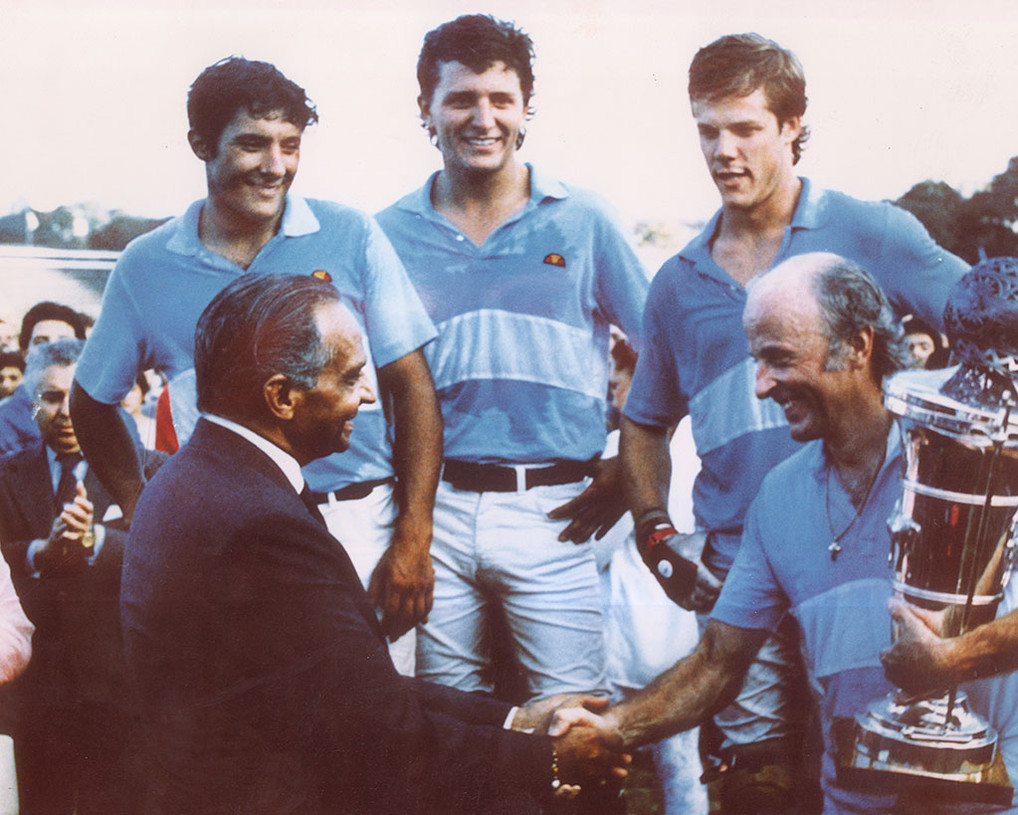
THE SCION OF THE HOUSE OF KACHWAHA:
HH SAWAI PADMANABH SINGH JI
LATE HIS HIGHNESS
MAHARAJA BHAWANI SINGH JI

The torch has passed on to 'Pacho,' HH Sawai Padmanabh Singh of Jaipur, an accomplished player who has been in the saddle since 2015 when he played in England with the Guards Polo Club.
His remarkable performance at the zonal playoffs in Iran, leading up to the 2017 XI FIP World Polo Cup in Sydney, helped India secure a win against Pakistan.
“Polo is something that has been in our family for so long, and I am honored to be able to carry this legacy. It really inspires me to hear about how my grandfather and his father before him brought laurels not just to our family and Jaipur, but to our great country. This motivates me to work hard for my family, for Jaipur, and for India.”
HH Sawai Padmanabh Singh of Jaipur maintains a rigorous routine, including four hours of polo training and two hours in the gym. His concerns and hopes for polo include improving the conditions of the grounds and ponies and attracting more sponsors.
LATE HIS HIGHNESS
MAHARAJA SAWAI MAN SINGHJI II

Sawai Man Singh II ( Mor Mukut Singh; 21 August 1912–24 June 1970 ) was the last ruling Maharaja of Jaipur State belonging to Kachwaha clan of Rajputs. He ruled the princely state between 1922 and 1949, when the state acceded unto the Dominion of India. Thereafter, he held office as Rajpramukh of Rajasthan between 1949 to 1956. In later life, he served as Ambassador of India to Spain.
He was also a notable sportsman and celebrated polo player.
Sawai Man Singh II, was born Mor Mukut Singh, the second son of Sawai Singh (Thakur Sahib) of Isarda by his wife Sugan Kunwar from Kotla (Uttar Pradesh). His father was a nobleman belonging to the Kachwaha clan of Rajputs.
Mor Mukut grew up in the dusty, walled township of Isarda, a chief Thikana of the Rajawat sub-clan which lies between the towns of Sawai Madhopur and Jaipur in present-day Rajasthan. His family was connected to the ruling house of Jaipur and Kotah (where his father's sister was married). The then-Maharaja of Jaipur, Sawai Madho Singh II, had been born the son of a former Thakur of Isarda and had been adopted into the ruling family of Jaipur
POLO PRESTIGE: ROYAL FAMILY'S TIMELESS
POLO CONNECTION

Brigadier Sawai Bhawani Singh Bahadur MVC (22 October 1931 – 17 April 2011) was the titular Maharaja of Jaipur from 24 June 1970 to 28 December 1971, when all titles, privileges, and privy purses associated with princely states in India were abolished by the 26th Amendment to the Constitution of India. He died at age 79 due to multi-organ failure.
Born to Maharaja Sawai Man Singh II and his first wife, Marudhar Kanwar of Jodhpur, Bhawani Singh was educated at Sheshbagh School, Srinagar, The Doon School, Dehradun, and later Harrow School in the United Kingdom. As the first male heir born to a reigning maharaja of Jaipur for generations, his birth was a celebrated event in Jaipur.
Sawai Bhawani Singh ascended the throne of Jaipur on 24 June 1970 following the death of his father, and held the title of Maharaja until the abolition of the princely order, his Privy Purse and other royal entitlements by Indira Gandhi in 1971, although he remained generally honoured like most other erstwhile rulers. He married Princess Padmini Devi of Sirmur on 10 March 1966 in a ceremony held at Delhi. She was the daughter of his father's polo-playing friend HH Maharaja Rajendra Prakash of Sirmur by his wife
Maharani Indira Devi.












